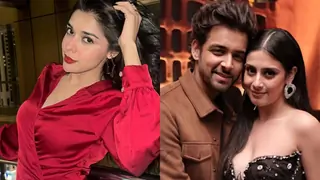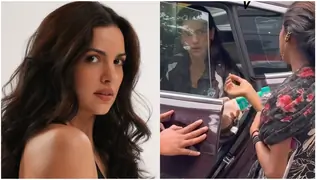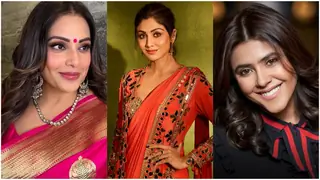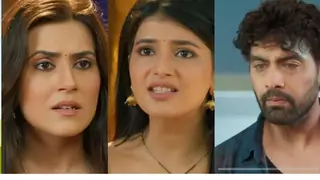As the audience applauded antic after antic of a fraying-at-the-seams Tanu, and cheered the feistiness of her alter ego Datto, I wondered how we got to this stage, where faux feminism (in the absence of the real thing) is what our female characters are increasingly being saddled with.
In the sequel to Tanu Weds Manu, the lead female character hasn't changed much. Tanu, once a consumer of cheap spirits in Kanpur, now gulps down large quantities of red wine and beer in London. And with every bottle she is telling us something. See how cool I am, so liberated. I don't need my husband's permission to drink. Indeed I don't need my husband at all, so I've consigned him to a mental asylum. There are no cigarettes to shock this time around, though the reasons may have more to do with the film certification board's compulsory No Smoking disclaimers that litter the screen, rather than any growth or change in character. Trapped in a bad marriage, Tanu traipses through the film, bindi and mangalsutra intact for a large portion of the screen time, flirting, drinking and getting her own way.
"Here is a woman with no interests, no hobbies and no ambition. A man without these would have been labelled a loser. But it appears that this is perfectly acceptable for women."
The drowning of sorrows in alcohol went away, I thought, with Devdas. Even with him we saw what a loser he ultimately was, unable to bear the harshness of reality. As we grew up, and slowly with us our cinema, alcohol as celebration trumped alcohol as solution. Ever since Aamir Khan's character in Dil Chahta Hai, took to the streets of Sydney to outrun his broken heart, our male heroes discovered a new way to cope with angst. They got on with their lives, lonely and loveless though they may have been, before the inevitable happy ending.
But alcohol and women is never such an easy relationship, especially in our cinema. Give the woman a glass of wine in a film, and there is a subtext. Both Priyanka and Kangana in Fashion, who go from being wholesome girls to drinking, smoking, drugs and finally indiscriminate sex, are crude caricatures of the good girl turned bad. And while the idea of the smoker/drinker as the bad girl is both false and reprehensible, it does not deem it's opposite to be true. Tanu is not more modern or liberated, or indeed any better or worse than the girl in Page 3. Rebellion is not always liberation. And Tanu even as a rebel has no cause. She is just a spoilt, aimless young girl, who's turned into a woman who doesn't know how to make relationships work.
Marriages break down all the time, and to assign blame to a single party is unfair. Manu as a husband is quite a prize -- a successful doctor, an indulgent husband and most of all a very patient man accepting of Tanu's shenanigans. Why then does she feel so trapped, so full of angst? We do not know Tanu's educational qualifications, but presumably they are nowhere close to her cardiologist husband's. Still, running a crche, as he suggests, should be well within her skill level. Surely as an equal partner in a marriage, she has a responsibility to contribute financially. She's certainly given the opportunity. How does she botch that up too?
"The attention she receives from the men seems to affirm her identity; she is who she is because she can get men to pay attention."
Here is a woman with no interests, no hobbies and no ambition. A man without these would have been labelled a loser. But it appears that this is perfectly acceptable for women. So Tanu has angst, the angst of the whole world not revolving around her. We all know this type. The spoilt rich girl, whose only interests are partying, boys, clothes, the beauty parlour -- all funded by the man in her life, first the father, then the husband. The only difference is that Tanu is not really rich, merely middle class. Perhaps in some eyes that excuses her excesses and her self-absorption.
A married woman, she flirts indiscriminately. The attention she receives from the men seems to affirm her identity; she is who she is because she can get men to pay attention. She appears at the marriage discussions of a younger sibling drunk on vodka, dressed in a towel. She uses her sexuality to order around the men in her life, reducing them to chauffeurs and errand boys. She walks alone, drunk, on deserted streets in the dead of the night in small town India.
When did all this become modernity? True modernity is hardly about how one dresses, but how one behaves. Liberation is not about pushing boundaries regardless of the consequences, but recognising that some boundaries will take a while to move. A smart modern Indian woman knows this. But Tanu doesn't. I have only one explanation for this -- the diagnosis Manu gives in the first scene of the film, that she is bipolar. Tanu is such an unreal, unlikable character, that in spite of her denial of the bipolar diagnosis, it is the most charitable explanation for her behavior.
Tanu is not the only misogynistic trope in this film. When Manu describes his wife's mood swings, her passive aggressive behavior and other classic symptoms of a mentally unhinged character, a doctor, at what is a premier English medical facility, dismisses this as a description of all women. A friend played by Swara Bhaskar, tom toms her conceived-by-artificial insemination child, as if the modernity of the procedure makes it all right for her to make a decision as important as having a child without consulting her partner.
"In the end, what does a woman have to do for acceptance? She has to cry. She has to ask forgiveness. She has to mould herself to look like the current object of her man's affections."
Manu himself, in spite of his many positives, leaves much to be desired. In the first film he says yes to marrying a drunk, semi-conscious girl, with no idea of her personality. He has obviously chosen her for her pretty face. He makes the same mistake again, falling for a face. The same face. Suggesting that the only aspect of a woman with any worth is her physical appearance. And as for the Datto, the state champ, all I can say is that she uses her fists far more than her brain. If violence is not the answer for a man, why is violence when used by a woman applauded?
In the end, what does a woman have to do for acceptance? She has to cry. She has to ask forgiveness. She has to mould herself to look like the current object of her man's affections. She has to cook and clean, debasing herself at her husband's second marriage, to prove herself worthy of him. In this universe this works. Datto can keep her feistiness and state medals for herself. The real prize -- the man -- goes to the woman with the mangalsutra and sindoor intact.
The macho hard-drinking male who stalks the female character in the first half only to have her fall in love with him in the second is still around, finding his niche in the regressive blockbuster. But there's also a gentler modern man showing up on our screens. A man not afraid to cry, a man who's a colleague and friend first, a man who refuses to use a gun when his brain will do. We like this man. Why then do we applaud a Tanu, who has taken on the worst aspects of the commercial Hindi film hero?
Can Kangana be a heroine without being a Revolver Ranior a hard drinking, foul-mouthed caricature of the leading man? Is it possible for Rani Mukherjee to be strong without being Mardaani? Can Anushka rebel against the wrongs against her and society without a cigarette in her mouth depicting her liberation?
Love is no longer enough on the screen. There are now real men out there, who respect, care and understand. Don't they deserve women who do the same?
http://www.huffingtonpost.in/samina-motlekar-/the-faux-feminism-in-tanu_b_7449256.html?utm_hp_ref=tw


































29